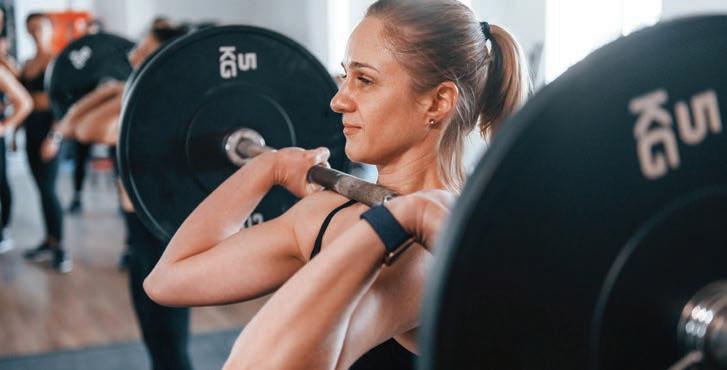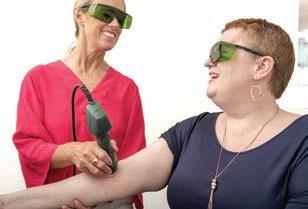
4 minute read
Busting the myths around forwomen
Women can, and should lift heavy weights. It’s a fact, backed up by plenty of research 1. We need to build muscle and we need strong bones if we want to be physically independent as we age.
For a long time there has been a fear, or a hesitation at least, when it comes to building muscle in women. I personally believe this is because of the ideal beauty standards women are measured against in our society –thin and slender is seen as good, wide and bulky is seen as less desirable. At the risk of turning this article into a sociology and feminism essay, I’ll stop here, but it’s definitely food for thought! Ten or more years ago you would typically see women doing more cardio based exercise than resistance training (lifting weights). I’m excited to see that in recent years there has been a big shift in attitudes towards women’s health, and now more and more women are starting to strength train as a way of looking after their body.
So, what is all the fuss about when it
comes to strength training – why is it so important for women? Let’s bust some myths!
MYTH #1 You may remember your Great Aunt Eunice telling you that lifting heavy weights will make you big and bulky, and you don’t want to be too big – take no notice!
FACT In reality, getting “bulky” from lifting weights is extremely hard. I’m not one hundred percent sure what a bulky body is, but I’m going to go ahead and presume it means big, broad, wide with big muscles. To get this sort of body you would have to have a large level of testosterone in your body, have an extremely high protein and calorie diet, train multiple times a day and pretty much make building muscle your full time job! My point is, it’s hard to build muscle “bulk”, so there’s zero possibility that you would accidentally end up looking like The Rock if you were to start lifting heavy weights.
MYTH #2 You’ll injure yourself if you lift heavy weights.
FACT Injuries typically happen when you lift something too heavy for your current strength level, with
BY LOUISE HURLEY
poor technique. When you work with the right professionals they can help you start to increase your strength gradually with progressive overload. Strength training in women has actually been shown to decrease the risk of injuries, including back pain and brittle bones, especially for post–menopausal women 2
MYTH #3 Lifting heavy weights is bad for your joints as you get older.
FACT Not only does lifting heavy weights build muscle, but it also increases bone density, resulting in fewer injuries as you get older, and increases the stiffness and thickness of your connective tissue. This all means that if start strength training now and you’re lucky enough to grow old, you’ll be more physically independent and less likely to experience falls and if you do fall, you’ll have a lower risk of fractures3
MYTH #4 I can’t lift heavy weights after having children.
FACT Almost all women after giving birth need pelvic floor rehabilitation, especially if they experience pelvic organ prolapse. Lifting heavy weights is something that you should gradually work up to under the guidance of a women’s health physiotherapist and a MumSafe™ trainer, but it’s never off the cards completely. With good pelvic floor rehabilitation, you can absolutely lift heavy weights after having children.
FACT It’s a fact that dense bones and strong muscles weigh more than fat. So yes, if you were to build more muscle, get stronger bones and not lose any body fat then you would weigh more. However, the number on the scales is not a good measurement of your overall health and I believe that an increase in this number is well worth stronger muscles and bones! In the long term you’re more likely to lose body fat when you have bigger muscles because it increases the speed of your metabolism.
So how can you start to add heavy weight lifting into your life?
What is considered heavy will differ from person to person depending on their current strength and fitness.
The best way to determine whether you’re lifting heavy enough (or not too heavy) is to work with the right fitness professional. A heavy weight is roughly seventy percent of the maximum weight you can lift or move with, also known as your one repetition max (1RM). This is very general advice and you should always take into account your individual needs
Always start light, aim for between 5–12 repetitions of a movement and gradually increase as your confidence and strength grows
Ask for help when you need it. It’s so much better to find the right person in the beginning who can help you start lifting heavy weights, rather than struggle through, feeling unsure and risking injury
If you love other forms of exercise then never stop what you love doing, just try to add in some weight training when you can. Movement is a bit like your nutrition – you need variety to thrive!

Louise Hurley As a MumSafe™ trainer and Pregnancy and Postnatal Corrective Exercise Specialist, Louise’s mission is to help mums at every stage of motherhood safely start or return to exercise. Louise is the owner of Strong Mums and runs small group training and 1:1 PT. Find out more at www.strongmums.com or on social media @strongmumsgosford
Holviala, et al. (2006) Effects Of Strength Training On Muscle Strength Characteristics,Functional Capabilities, And Balance In Middle–Aged And Older Women. Journal of Strength and Conditioning Research, 20(2) 336–344. Kemmler, et al. (2004) Benefits of 2 Years of Intense Exercise on Bone Density, Physical Fitness, and Blood Lipids in Early Postmenopausal Osteopenic Women: Results of the Erlangen Fitness Osteoporosis Prevention Study (EFOPS). Arch Intern Med. 164(10):1084–1091 Rhodes, et al. (2000). Effects of one year of resistance training on the relation between muscular strength and bone density in elderly women. British journal of sports medicine, 34(1), 18–22
Leading Central Coast private practice, Cancer Rehabilitation & Lymphatic Solutions, developer of the unique OncoLaser system using MLS Laser, offer patients a premium and comprehensive allied health rehabilitation centre, providing high quality services to aid in quicker and more effective physical rehabilitation recovery from surgeries, cancer treatment, sports injuries and other conditions.


02 4312 7033 / 5/30 Karalta Rd Erina NSW 2250 www.coastalrehabhub.com.au coastalrehabhub










